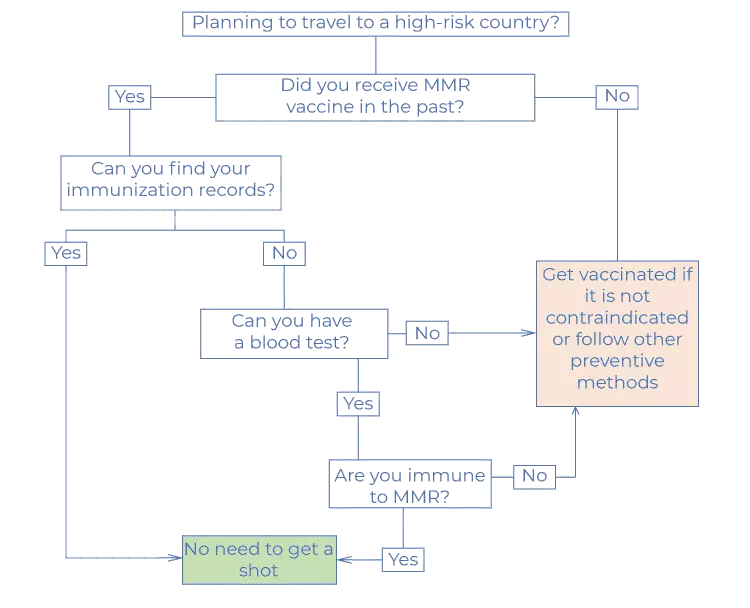MMR vaccine
This is a practical guide to MMR vaccination.
The best part?
We’ll give you only factual information based on reliable sources and our nearly 20 years of experience in travel medicine.
Contents
At a glance
 Required or recommended? The Centers for Disease Control and Prevention (CDC) recommends it; no countries require it
Required or recommended? The Centers for Disease Control and Prevention (CDC) recommends it; no countries require it How is it transmitted? Measles, mumps, and rubella are spread via airborne droplets (from a sneeze, cough, etc.)
How is it transmitted? Measles, mumps, and rubella are spread via airborne droplets (from a sneeze, cough, etc.) Is MMR vaccine a part of routine childhood immunizations? Yes! Two doses of the MMR vaccine are given to children as part of routine childhood immunizations
Is MMR vaccine a part of routine childhood immunizations? Yes! Two doses of the MMR vaccine are given to children as part of routine childhood immunizations Duration of protection: Lifetime
Duration of protection: Lifetime Adult booster necessary? Yes! The adult booster is recommended for people without valid proof of immunization or laboratory evidence of immunity
Adult booster necessary? Yes! The adult booster is recommended for people without valid proof of immunization or laboratory evidence of immunity

MMR Vaccine Info
Childhood vaccine schedule
The table below shows the MMR childhood immunization schedule. Please, check your records to see whether you have received all the shots at the recommended time intervals
First dose: 12–15 months of age
Second dose: 4–6 years of age
Single dose
93% against measles
78% against mumps
97% against rubella
Two doses
97% against measles
88% against mumps
MMR Vaccine protection
Lifelong
Adult booster schedule
The table below shows the recommended vaccination schedule for adults who completed their MMR childhood immunization but have no proof of immunity.
Single dose (for the majority of people without proof of MMR immunity)
Two doses (for healthcare providers with no proof of MMR immunity and international travelers and students who have never received this vaccine)
- First dose: as appropriate
- Second dose: at least 28 days after the first dose
Single dose
93% against measles
78% against mumps
97% against rubella
Two doses
97% against measles
88% against mumps
MMR Vaccine protection
Lifelong

Where It’s Most Common
Measles, mumps, and rubella are viral infections that mostly occur in childhood. All of these vaccine-preventable diseases may result in serious health complications.
All three infections have spread worldwide. The number of cases vary among geographic regions mostly based on whether routine MMR vaccination
[1]
Measles, Mumps and Rubella (MMR)
https://www.fitfortravel.nhs.uk/advice/disease-prevention-advice/measles-mumps-and-rubella-mmr
is included in the national immunization schedule (cases are more common in countries where it is not) and maintenance of optimal coverage (at least 80% of the population should be vaccinated).
Time after time, measles outbreaks have occurred in Europe, Asia, Africa, South America, and Central America. These outbreaks affect hundreds of thousands of people and kill over 140,000 people a year (2018 data).
Watch this educational video made by the CDC to learn more about this problem.

About Measles
Measles is a viral infection that has spread globally. It is a highly contagious infection that results in major epidemics and serious public health problems. In the pre-vaccination era, measles killed millions of people every year. Thanks to safe and effective vaccines, the number of deaths was reduced by 70%–80%.
In the US only, before the introduction of the MMR vaccine, around 4 million cases of measles were reported annually. This number has reduced by 99% after the widespread use of the measles vaccine.
This section summarizes the most important facts about measles.

About Mumps
Mumps is an acute viral infection that first affects human salivary glands. It usually occurs in childhood. However, adults also get it and if they do, they are at higher risk of having the severe form of the disease and of development of serious health complications.

About Rubella
Rubella is an easily transmitted infection that mostly affects children and adolescents. Though it is mostly a self-limited infection among children, when pregnant women get rubella, they are likely to have a baby with birth defects and disabilities.

MMR Vaccination FAQ
Here are the questions our patients frequently ask about the MMR vaccination. [2] Measles, Mumps, and Rubella (MMR) Vaccination: What Everyone Should Know https://www.cdc.gov/vaccines/vpd/mmr/public/index.html We’ve answered them based on 20 years of being the busiest travel clinic in Midtown Manhattan. Let’s dive in!







